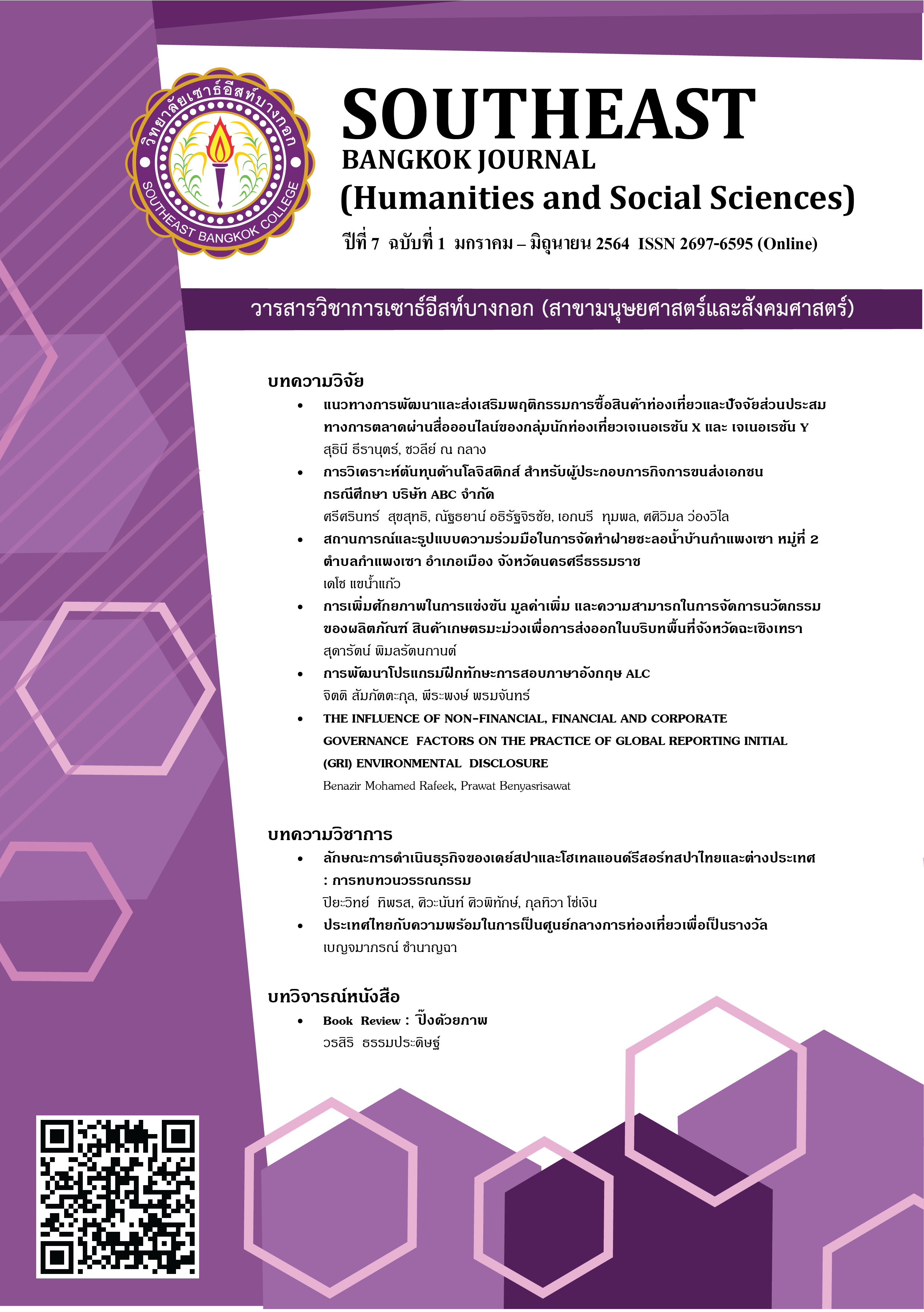THE INFLUENCE OF NON-FINANCIAL, FINANCIAL AND CORPORATE GOVERNANCE FACTORS ON THE PRACTICE OF GLOBAL REPORTING INITIALTIVE (GRI) ENVIRONMENTAL DISCLOSURE
Main Article Content
บทคัดย่อ
หลักฐานจากงานวิจัยได้ชี้ว่าการเปิดเผยข้อมูลทางบัญชีในด้านสิ่งแวดล้อม มีผลต่อปฏิสัมพันธ์ของปัจจัยด้านสิ่งแวดล้อมกับแนวปฏิบัติด้านการเปิดเผยข้อมูลบริษัท ในประเทศที่พัฒนาแล้วถือว่าการไม่ปฏิบัติตามมาตรฐานการรายงานความยั่งยืนเป็นความเสี่ยงต่อชื่อเสียงของบริษัทและผู้มีส่วนได้ส่วนเสีย งานวิจัยนี้มีวัตถุประสงค์เพื่อศึกษาอิทธิพลของปัจจัยที่ไม่เกี่ยวกับการเงิน การเงิน และการกำกับดูแลกิจการที่มีต่อแนวปฏิบัติในการเปิดเผยข้อมูลด้านสิ่งแวดล้อมที่กรอบการรายงานระดับโลก(Global Reporting Initiative ; GRI) กำหนดไว้ กลุ่มตัวอย่างในการศึกษา คือบริษัทที่จดทะเบียนในตลาดหลักทรัพย์แห่งประเทศไทยที่มีรายชื่อหลักทรัพย์ในดัชนี SET และเปิดเผยรายชื่อจำนวน 61 บริษัท โดยใช้ข้อมูลทุติยภูมิจากรายงานประจำปีของแต่ละบริษัท ในช่วงปี ค.ศ. 2016-2019 ผลการวิจัยพบว่า ปัจจัยที่ไม่ใช่การเงิน ได้แก่ ประสิทธิภาพด้านเศรษฐกิจ การประเมินคุณภาพ และสภาพคล่อง มีอิทธิพลทางบวกอย่างมีนัยสำคัญ ในขณะที่ปัจจัยที่เกี่ยวกับการเงิน ขนาดขององค์กร การเติบโตของบริษัทในภาพรวม และ ผลกำไร มีอิทธิพลทางลบต่อแนวปฏิบัติในการเปิดเผยข้อมูลด้านสิ่งแวดล้อมที่กรอบการรายงานระดับโลกกำหนด นอกจากนี้ผลการศึกษายังสรุปได้ว่า บริษัทที่เกี่ยวข้องกับสิ่งแวดล้อมในประเทศไทยควรเปิดเผยข้อมูลมากกว่านี้
Article Details
เอกสารอ้างอิง
Awan, U., Imran, N., & Munir, G. (2014). Sustainable development through energy management: Issues and priorities in energy savings. Research Journal of Applied Sciences, Engineering and Technology, 7(2), 424-429. Retrieved from https://doi.org/10.19026/rjaset.7.271
Datt, R. R. (2016). Corporate incentives for external carbon emissions assurance : An international study. (Thesis for the degree of Doctor of Philosophy in School of Business (Accounting), Western Sydney University). Retrieved from https://researchdirect.westernsydney.edu.au/islandora/object/uws:37591/
Frendy & Kusuma, I. W. (2011). The impact of financial, non-financial, and corporate governance attributes on the practice of global reporting initiative (GRI) based environmental disclosure. Gadjah Mada International Journal of Business, 13(2), 143. Retrieved from https://doi.org/10.22146/gamaijb.5488
Fuadah, L., Safitri, R. H., & Yuliani, Y. (2019). Factors influencing sustainability reporting and financial performance in Indonesia. Srivijaya International Journal of Dinamic Economics and Business, 3(1), 53. Retrieved from https://doi.org/10.29259/sijdeb.v3i1.53-72
Haniffa, R., & Cooke, T. E. (2002). Culture, corporate governance and disclosure in Malaysian corporations. Abacus, 38(3), 317-349. Retrieved from https://doi.org/10.1111/1467- 6281.00112
Issa, A. (2017). The Factors Influencing Corporate Social Responsibility Disclosure in the Kingdom of Saudi Arabia. Australian Journal of Basic and Applied Sciences, July 2017, 1-19. Retrieved from http://www.ajbasweb.com/old/ajbas_July_2017.html
Kılıç, M., & Kuzey, C. (2017). Factors influencing sustainability reporting: evidence from Turkey. SSRN Electronic Journal • December 2017. Retrieved from https://doi.org/10.2139/ssrn.3098812
Maleka, T., Nyirenda, G., & Fakoya, M. (2017). The relationship between waste management expenditure and waste reduction targets on selected JSE companies. Sustainability, 9(9), 1528. Retrieved from https://doi.org/10.3390/su9091528
Poowadin, P., Prasertsri, W., & Nilapornkul, N. (2018). The Relationship between Corporate Sustainability Disclosure and Financial Performance: Case Study of Listed Company in Thailand. Dusit Thani College Journal, 12(3), 429-444. Retrieved from https://dtc.ac.th/research/วารสารวิทยาลัยดุสิตธานี-5
Sutopo, B., Kot, S., Adiati, A., & Ardila, L. (2018). Sustainability reporting and value relevance of financial statements. Sustainability, 10(3), 678. Retrieved from https://doi.org/10.3390/su10030678


